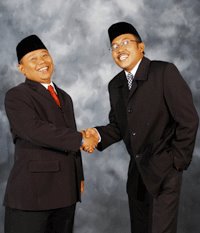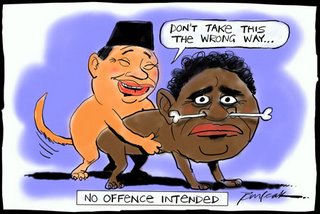A friend told me few days ago that one of the largest telecommunication companies in Indonesia had retained two media 'observers' as lobbyist with monthly fee of US$8,000 per month. What's the job? To defend the company's policies in public, lobbying regulators or parliament. Nothing wrong with that. But I hate to see media quoted these guys as 'observers'. Blame the journalists? Sure, because they're too lazy to do little research on who's talking. But these paid observers should tell the truth to public at large too.
I read an advertisement this morning about a seminar about telecommunication and corruption. One of the speakers would be the lobbyist but claimed himself in the ad as media and telecommunication law expert. The other guy would be the moderator of the panel discussion and claimed himself a public policy observer. I smell something.
So I decided to tell my reporters to be careful with these guys, not because they're paid observers but because they didn't tell public that they're representing the telecommunication industry.
That's also my standpoint when it comes to observers like Umar Juoro and Aviliani, both serve as commissioners at Bank Internasional Indonesia (BII) and Bank Rakyat Indonesia (BRI) respectively. They have the rights to be commissioners, but when they make statement, journalist should tell public that these guys are also work for a company that might related to the statements. On the other hand, these paid economists should frankly tell public that they said so representing a company's view.
Journalists should also make it clear to readers on some economists turns legislators. I just can't understand that guys like these mix up things easily and keep the readers in the dark on whether they talk as economists or legislators paid to serve people's interests.
Observers should also tell the truth when submitting op-ed to newspapers. We often see an expert staff for the state-owned enterprises minister and also commissioner in a state-owned bank, under the state payroll, wrote op-ed about SOE policies in newspapers as a lecturer. Or the president of a state-owned investment bank wrote an op-ed with the title as SOE observer.
So, I decided to list down economists or observers currently under the payroll of some companies/agencies:
- Umar Juoro: Economist, commissioner at Bank International Indonesia (BII)
- Aviliani: Economist from INDEF, commissioner at Bank Rakyat Indonesia/BRI (state-owned bank)
- Drajad Wibowo: Economist, legislator from Partai Amanat Nasional (PAN), former commissioner at Bank Negara Indonesia (SOE).
- Sunarsip: Economist, commissioner at BRI
- Didik J. Rachbini: Economist, legislator from PAN
- Pradjoto: Banking law expert, commissioner at Bank Mandiri (state-owned bank) and Bank Internasional Indonesia (BII)
- Arif Arryman: Economist from Econit, commissioner at Telkom (state-owned)
- Setyanto P. Santosa: Economist, commissioner at Indosat
- Muhammad Ikhsan: Economist, expert staff for Coordinating Minister for the Economy, former commissioner at PT Bakrie & Brothers Tbk (owned by Bakrie Family)
- M. Chatib Basri: Economist, advisor to government, commissioner at PT Astra Otoparts Tbk
- Sjahrir: Economist, advisor to president Susilo Bambang Yudhoyono
- Anggito Abimanyu: Economist, Executive at the Ministry of Finance, Commissioner at PT Telkom
- Kurtubi: Economist, staff at Pertamina (SOE)
- Prof Subroto: Economist, advisor to PT Medco Energi Internasional Tbk (oil and gas company); Commissioner at PT DBS Bank Indonesia (a subsidiary of DBS Singapore).
- Prof Sadli: Economist, commissioner at PT Sepatu Bata Tbk
- Sutrisno Iwantono: Economist, commissioner at PT Bank Bukopin Tbk.
- Raden Pardede: Economist, commissioner at PT Bank Central Asia Tbk
- Cyrillus Harinowo: Economist, commissioner at PT Bank Central Asia Tbk
- Prof Roy Sembel: Management expert, commissioner at PT Bank Niaga Tbk
- Prof Din M. Syamsuddin: Chairman of PP Muhammadiyah, chairman of Syariah supervisory board of PT Bank Danamon Tbk (a subsidiary of Temasek Holdings)
- Rijanto: Bank observer, commissioner at PT Bank Panin Tbk
Imagine how much money a commissioner at a state-owned bank could get?
According to the financial report of BRI in 2005, bonus for the management was Rp19 billion with stock option of Rp35 billion. The state-owned bank didn't disclose the salary for both directors and commissioners. Bank Mandiri disclosed it better. Total salary for Mandiri's commissioners was Rp13.8 billion, stock option of Rp169 billion for the management, and bonus of Rp26 billion for the financial year 2005.
Labels: ASTRA, Bakrie, Bank Mandiri, Indosat, Medco, Pertamina, TELKOM, Temasek
READ MORE!!!





